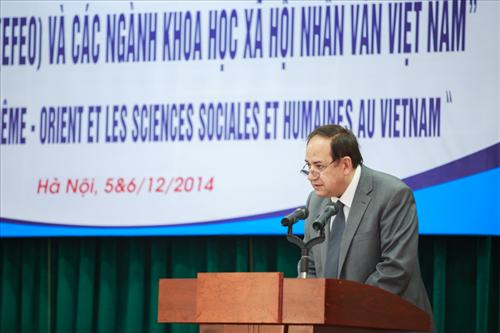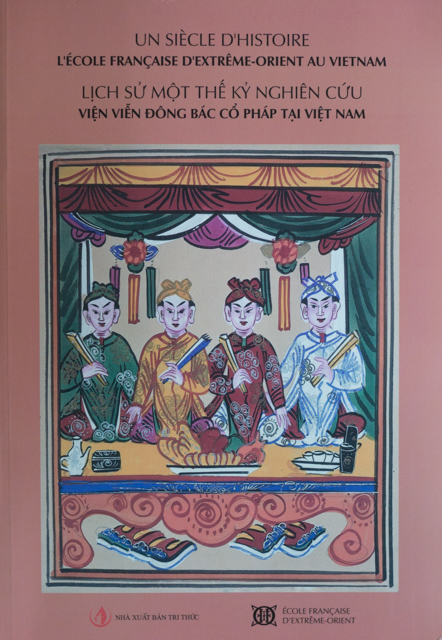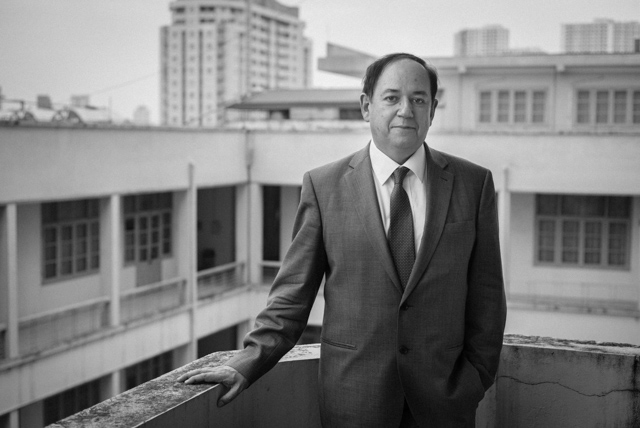
To recount more than a century of research that the French Institute of Far Eastern Studies (EFEO) conducted in Vietnam, it is first necessary to broaden the timeline, placing this particular history within the overall history of the Institute, or more broadly, the history of Oriental studies in France at the time of its founding. If the field of Vietnamese studies has attracted attention and undergone many changes, this is largely due to the development of the EFEO itself. Conversely, if from its inception the EFEO shone in the "Far East" with a desire to thoroughly understand this region, it was thanks to the dynamism of its first members, who were present in Hanoi from 1902 and who laid the intellectual and material foundations for its long-term existence, allowing for scientific investment over a long period and on a continent-wide scale in Asia. Subsequent researchers were instrumental in exploring and understanding the rich realities on the ground, forging close relationships with Vietnamese scholars and traditional elites—those who inherited a culture and knowledge that had previously been unknown in the West. In this respect, the history of the EFEO and the history of Vietnamese studies are intertwined, eventually leading to a tendency to view them as one and inseparable.

The cover of the book "A Century of Research History at the French School of Far Eastern Studies". (Photo: Thanh Long)
Recalling the activities of the EFEO in Vietnam, it is first necessary to return to the origins of this institution to recall what were the Institute's initial orientations as well as what constitutes its current identity with its presence in Asia. This is also a way to better understand the Institute's scientific and organizational aspects through the research it has undertaken, as well as through the emergence of new research fields, but at the same time, within the often tragic historical conditions in Asia, which have driven changes and caused temporary disruptions.
This publication does not go against the tradition of commemorating founding anniversaries or major scientific events. Nor is it the first publication recounting the path EFEO has taken since its founding. High-quality, comprehensive studies documenting EFEO's history have already been collected to such an extent that we have no ambition to present anything truly new. We simply wish to offer readers a summary of the period commemorating the Institute's 20th and 50th anniversaries. These two events initially took place in Hanoi and Saigon, and several thematic articles were published in the Institute's journal or in some journals published by colleagues in Saigon at that time. The centenary of the EFEO was celebrated in 2001 in Paris with a major conference and the publication of two special issues of the EFEO (LXXVII) on research conducted leading up to the year 2000. These two special publications addressed the missing comprehensive assessments. The first,A century of Asian studies. French School of Far Eastern Studies, 1898-2000This book introduces the trends and works of the EFEO. The second book,Asian researchers,This presentation, in catalog form, showcases the personal stories and journeys of all EFEO's scientific members, along with a list of all those who have collaborated with EFEO since its establishment. A celebration of EFEO's founding anniversary was also held in Vietnam, at the initiative of the EFEO Center in Hanoi, through an exhibition and the publication of a bilingual publication.Looking back at a century of scientific research, the French School of Far Eastern Studies in Hanoi 1900-2000 - L'École francaise d'Extrême-Orient à Hanoi 1900-2000, regards croisés sur un siècle de recherches,With the support of the National Center for Social Sciences and Humanities, now the Vietnam Academy of Social Sciences, of Hanoi National University, in order to recall the origins of this Institute.
Transcending memories is never a waste of time, as Catherine Clémentin-Ojha and Pierre-Yves Manguin wrote in the introduction to the book.A century of Asian studies,The EFEO became a subject of study, becoming a completely separate entity, at a turning point in the 20th century. Experts in intellectual history and the sociology of knowledge developed a completely new perspective on the EFEO's activities and the political and social environment at the time, focusing on the difficult balance between maintaining autonomy and the inherent indifference to all humanities research within the specific context of French colonial exploitation in Indochina. Against the backdrop of widespread criticism of Oriental studies, which began in the 1970s and intensified towards the end of the 20th century, the EFEO has since attracted external attention. This also necessitates a reassessment of the Institute's scientific output and a clear reorganization of its structure. These critical perspectives first and foremost allow us to demonstrate the Institute's undeniable intellectual contribution to "Indochina studies"—not to mention Southeast Asia and cultural regions—a contribution that continues to shape the EFEO's reputation today. The recognition of the EFEO's founding members, of its French and Vietnamese patrons, is immense, shared, and unanimously agreed upon.

Professor Yves Goudineau (Director of the French Institute of Far Eastern Studies). (Photo: Thanh Long)
Upon reading the following section on the past, one will notice that this book does not aim to commemorate the founding anniversary of the EFEO in Vietnam, but rather concludes a series of events throughout the “Franco-Vietnamese Year 2013-2014,” in which the EFEO was a key institution in cultural and scientific exchange between France and Vietnam. Here, we would like to mention two exhibitions of different scales but complementary to each other that were organized within the aforementioned framework. The first exhibition, entitled “EFEO - Documentation and Fieldwork in Vietnam,” took place in Ho Chi Minh City in February 2013, followed by Da Nang in May 2013 and Hanoi in December 2014. The second exhibition, “Vietnam, Destination – Photographs from the French School of Far Eastern Studies,” was presented at the Cernuchi Museum (Paris, March-June 2014) and subsequently in Hanoi (Espace and the National Museum of History, December 2014).
This book provides a comprehensive overview of the history and current scientific work of EFEO in Vietnam. The emphasis on recent activities allows for a summary of the past 20 years, since EFEO re-established its center in Hanoi in 1992 and, since 2012, inaugurated its new location in Ho Chi Minh City in partnership with the French Development Agency (AFD).
It should also be emphasized that the impetus for the publication of this book stemmed from a suggestion by Vietnamese colleagues, friends who have always shown genuine commitment to the EFEO and who have written excellent accounts of the Institute's history. Since the founding of the Friends of the EFEO in 1934, many Vietnamese have joined the association and contributed to the quarterly publication of the journal "Les cahiers de l'École francaise d'Ex treme-Orient." Besides regular contributors, among the friends of the EFEO were prominent figures such as Nguyen Van Vinh, Pham Quynh, Tran Trong Kim, Duong Quang Ham, and Vo Nguyen Giap. Subsequently, for many decades, these individuals continued to pursue the Institute's work and remained wholeheartedly dedicated to it during the difficult times of the struggle for independence. They were also the ones who suggested relocating the EFEO office to Hanoi in the early 1990s. Among recent examples of this shared heritage recognition, we note the 2009 publication of a book entirely dedicated to the history of the EFEO in Vietnam.French School of Far Eastern Studies (1898-1957).
Finally, and especially noteworthy, is the seminar “EFEO and Social Sciences and Humanities in Vietnam,” which will take place in Hanoi on December 5-6, 2014, at the initiative of the Hanoi University of Social Sciences and Humanities and its Rector, Mr. Nguyen Van Khanh, who did not miss the opportunity to enrich our understanding of a shared history. Since the 100th anniversary of the Institute's founding, many new writings on scientific cooperation have emerged. We would like to briefly review these activities. In response to this kindness, this book hopes to contribute a stone to building the best understanding of the exchanges and activities that always connect Vietnamese research with EFEO.
Author:Professor Yves Goudineau
Newer news
Older news